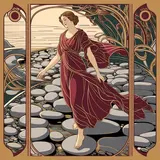
Turning Stumbling Blocks into Stepping Stones

In As a Matter of Course (1906), Annie Payson Call draws a metaphor between handling the obstacles of life and stepping over stones in our path. There will always be stones in our way, and it’s our job to watch where we’re going and step over them. You may, unfortunately, trip over one, even after having noticed and examined it. It’s even worse if other people are watching. Here is how she describes these stones:
These stones in the way are the result of a perversion of civilization, and the cause of much contraction and unnecessary suffering.
There is the physical stone. If the health of the body were attended to as a matter of course, as its cleanliness is attended to by those of us who are more civilized, how much easier life might be! Indeed, the various trippings on, and endeavors to encircle, this physical stone, raise many phantom stones, and the severity of the fall is just as great when one trips over a stone that is not there. Don Quixote was quite exhausted when he had been fighting the windmills. One recognizes over and over the truth spoken by the little girl who, when reprimanded by her father for being fretful, said: "It isn't me, papa, it's that banana."
There is also the over-serious stone; and this, so far from being stepped over or any effort made to encircle it, is often raised to the undue dignity of a throne, and not rested upon. It seems to produce an inability for any sort of recreation, and a scorn of the necessity or the pleasure of being amused. Every one will admit that recreation is one swing of life's pendulum; and in proportion to the swing in that direction will be the strength of the swing in the other direction, and vice versa.
One kind of stone which is not the least among the self-made impediments is the microscopic faculty which most of us possess for increasing small, inoffensive pebbles to good-sized rocks. A quiet insistence on seeing these pebbles in their natural size would reduce them shortly to a pile of sand which might be easily smoothed to a level, and add to the comfort of the path. Moods are stones which not only may be stepped over, but kicked right out of the path with a good bold stroke. And the stones of intolerance may be replaced by an open sympathy, - an ability to take the other's point of view, -which will bring flowers in the path instead.
Call uses these “stones” to discuss various types of self-imposed obstacles that can hinder progress and happiness. These obstacles include physical health issues, a lack of humor and playfulness, a tendency to exaggerate problems, negative moods, intolerance, and the like. She suggests that, by addressing these issues, we would create a smoother and more enjoyable path through life.
When Call refers to a “perversion of civilization,” she is noting that the repression of innate desires and emotions can cause suffering. The answer, she says, is not to resort to impulsive, uncivilized behavior, but to cope with them in a productive way. This is also a part of stepping over the stones of life.
Annie Payson Call was a prominent American writer and advocate for mental health and well-being, active during the late 19th and early 20th centuries. We’ve written about her work previously, here and here.